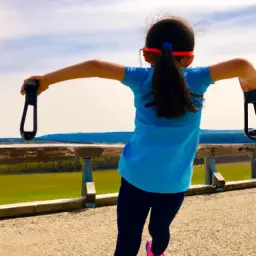If you’re a coach, you know that success in sports goes beyond talent and skill. It takes grit to overcome challenges, push through adversity, and achieve your goals. Grit is defined as the combination of passion, perseverance, and resilience, and it can be developed in athletes through intentional coaching strategies.
In this article, we’ll explore 10 essential tips for coaches who want to develop grit in their athletes. These tips will help you set realistic goals, emphasize hard work and effort, encourage resilience, foster a growth mindset, and celebrate achievements and progress.
With these strategies, you can help your athletes develop the grit they need to succeed not just in sports, but in life as well.
Key Takeaways
- Grit in athletes involves passion, perseverance, and resilience, and developing it can lead to increased self-confidence and self-efficacy.
- Coaches can develop grit in athletes by setting realistic goals, building resilience with coping strategies, encouraging a growth mindset, and providing opportunities for new experiences.
- Coaching strategies for developing grit include supporting players in goal setting, leading by example, encouraging a positive mindset, providing opportunities to step out of comfort zones, and highlighting the importance of learning from failures and setbacks.
- Encouraging a learning mindset and celebrating team achievements are also important in developing grit and boosting athletes’ confidence and motivation.
Define Grit and Its Importance in Sports
Grit, the tenacity and perseverance to overcome obstacles, is an essential trait for athletes to possess if they want to succeed in sports. But what exactly is grit?
The definition of grit is the ability to maintain passion and persistence towards long-term goals, even in the face of adversity or challenges. In sports, this means having the mental toughness to push through difficult workouts, recover from injuries, and overcome losses.
Developing grit in sports has numerous benefits. For one, it can lead to increased self-confidence and self-efficacy. Athletes who possess grit are more likely to believe in their ability to succeed, even when faced with setbacks. Additionally, grit helps athletes stay motivated and committed to their goals, which can lead to better performance and achievement.
By fostering grit in their athletes, coaches can help them develop the mental fortitude needed to succeed not just in sports, but in all aspects of their lives.
Set Realistic Goals
When it comes to setting goals in sports, it’s important to encourage your players to set their own goals. This way, they have ownership over their progress and are more likely to be motivated to achieve them.
As a coach, you can help your players break their goals into smaller, achievable objectives. This will make the goal seem less daunting and increase the likelihood of success.
Encourage Players to Set Their Own Goals
To help your players develop a strong sense of determination, encourage them to set their own goals and work towards achieving them with passion and dedication. This approach fosters player autonomy and goal-setting flexibility, giving them a sense of ownership and control over their development.
Allow players to identify areas where they want to improve and set goals accordingly. When players set their own goals, they are more invested in the outcome and are likely to work harder to achieve them.
As a coach, you can support this process by providing guidance on setting realistic and achievable goals that align with overall team objectives. Encourage players to break down larger goals into smaller, more manageable steps, and hold them accountable for their progress.
By empowering players to take ownership of their development, you are fostering a culture of grit and determination that will serve them well both on and off the field.
Help Players Break Goals into Smaller Achievable Objectives
Assisting players in breaking down larger goals into smaller achievable objectives can enhance their sense of ownership and motivation towards achieving their desired outcomes. Breaking barriers can be a daunting task, especially when it comes to sports. This is where the coach can step in and help players with goal planning.
Here are three tips to help players break goals into smaller achievable objectives:
-
Start with the end in mind: Encourage players to visualize their desired outcome and then work backwards to identify the smaller objectives that’ll help them get there.
-
Set SMART goals: Make sure the objectives are specific, measurable, achievable, relevant, and time-bound. This’ll help players stay focused and motivated.
-
Celebrate progress: Recognize and celebrate the achievements of each smaller objective. This’ll help players stay motivated and feel a sense of accomplishment as they work towards their larger goal.
Emphasize Hard Work and Effort
You can cultivate grit in your athletes by constantly reminding them of the importance of effort and instilling a hard work mentality. Emphasize the idea that success doesn’t come easy and that it takes hard work and determination to achieve their goals.
Encourage them to push through difficult times and remind them that setbacks and failures are just opportunities to learn and grow. As a coach, it’s important to lead by example and demonstrate the hard work and effort required to succeed.
Show your athletes that you’re willing to put in the same effort that you expect from them. Encourage them to set high goals for themselves and work tirelessly to achieve them. By emphasizing the value of hard work and effort, you can help your athletes develop the grit they need to succeed not only in sports but also in life.
Encourage Resilience
Now that you’ve emphasized the importance of hard work and effort, it’s time to focus on building resilience in your athletes. Being able to overcome adversity is a key component of mental toughness, and it’s a skill that can be developed with the right coaching strategies.
To help your athletes build resilience, encourage them to develop coping strategies for when things don’t go as planned. This could include visualization exercises, deep breathing techniques, or simply taking a moment to reflect and regroup. By teaching your athletes to approach challenges with a positive mindset and a willingness to adapt, you can help them develop the mental toughness needed to excel in sports and in life.
| Coping Strategies | Description | Example |
|---|---|---|
| Positive Self-Talk | Encouraging and uplifting statements | "I can do this" |
| Visualization | Creating mental images of success | Imagining scoring the winning goal |
| Deep Breathing | Slow, controlled breathing to reduce stress | Inhaling for 4 seconds, exhaling for 6 seconds |
| Mindfulness | Focusing on the present moment | Paying attention to your surroundings and sensations |
By incorporating these strategies into your coaching approach, you can help your athletes develop the resilience and mental toughness needed to overcome adversity and achieve their goals. Remember, building resilience is a process, so be patient and encourage your athletes to keep pushing forward even when things get tough. With time and practice, they’ll develop the skills needed to succeed both on and off the field.
Foster a Growth Mindset
To foster a growth mindset in your players, you need to encourage them to embrace challenges instead of shying away from them. Teach them that mistakes are opportunities for learning and growth, not something to be ashamed of.
By cultivating this mindset on your team, you’ll be helping your players develop the resilience and grit they need to succeed both on and off the field.
Encourage Players to Embrace Challenges
Embracing challenges is key for players looking to develop grit and succeed in sports, so encourage them to step out of their comfort zones and take on new obstacles. A challenge mindset is essential for players to face adversity and push through difficult times. Encouraging players to embrace challenges can lead to increased confidence, resilience, and overall growth.
To help players embrace challenges, coaches can provide them with opportunities to try new things and step out of their comfort zones. This can be done through drills or exercises that are slightly outside of their skill level or by setting challenging goals. By incorporating a challenge mindset into their training and mindset, players can develop the grit and determination needed to succeed in sports.
| Tips for Encouraging Players to Embrace Challenges | Examples |
|---|---|
| 1. Set challenging goals | Encourage players to set goals that are slightly outside of their comfort zones, such as running a faster time or scoring more points. |
| 2. Provide opportunities for new experiences | Introduce players to new drills or exercises that challenge their skills and abilities. |
| 3. Encourage a growth mindset | Highlight the importance of learning from failures and setbacks, and encourage players to view challenges as opportunities for growth. |
By incorporating these tips into your coaching strategies, you can help your players develop the grit and determination needed to succeed in sports. Remember to always encourage a growth mindset and provide opportunities for players to step out of their comfort zones. With time and practice, your players will be able to embrace challenges and achieve their goals.
Teach Players to Learn from Mistakes
Learning from mistakes is the key to unlocking a player’s full potential and achieving success in their sport. As a coach, you must encourage your players to adopt a learning mindset and embrace their mistakes as opportunities to grow.
It’s important to remind them that making mistakes is a natural part of the learning process and that they shouldn’t be discouraged by them. To help your players learn from their mistakes, offer them constructive feedback.
Instead of criticizing their performance, point out specific areas where they could improve and offer practical suggestions for how to do so. Encourage them to reflect on their mistakes and think about what they can do differently next time.
By doing so, you’ll help them develop a growth mindset and become more resilient in the face of challenges. Remember, mistakes aren’t failures, but rather opportunities for growth and learning.
Celebrate Achievements and Progress
As a coach, you need to celebrate your team’s achievements and progress to keep them motivated. This means recognizing small wins and accomplishments along the way.
Celebrating team achievements can also create a sense of camaraderie and boost team morale, leading to even more success in the future. So don’t forget to take the time to acknowledge and celebrate the hard work and dedication of your team.
Recognize Small Wins
By acknowledging the small victories, coaches can boost their athletes’ confidence and drive to succeed. Recognizing these small wins is essential because it helps athletes feel appreciated and valued.
When coaches celebrate these victories, athletes feel motivated to continue working hard and pushing themselves to achieve more. The importance of recognition cannot be overstated when it comes to building confidence through acknowledgement.
As a coach, it’s essential to recognize even the smallest of wins, such as improving a personal best time or completing a challenging drill. When athletes feel acknowledged for their hard work and effort, they are more likely to continue striving towards their goals.
So, take the time to acknowledge and celebrate every small victory, and watch your team’s confidence and motivation soar.
Celebrate Team Achievements
When you celebrate your team’s achievements, you create a sense of camaraderie and pride that fuels their motivation to continue striving towards success. As a coach, it’s important to acknowledge the hard work your team has put in and recognize their accomplishments.
By doing so, you not only boost team morale but also encourage your athletes to continue pushing themselves to reach their full potential.
Here are some team recognition and motivation techniques that you can use to celebrate your team’s achievements:
- Host a team dinner or outing to celebrate a big win or milestone
- Display team photos or accomplishments in a prominent location
- Give out team awards for outstanding performances or improvement
- Create a team chant or celebration that can be used after a successful game or practice.
By incorporating these techniques, you can help your team feel appreciated and valued while also fostering a strong sense of team spirit.
Celebrating your team’s achievements can go a long way in building a successful and cohesive team.
Frequently Asked Questions
How can coaches help athletes develop mental toughness?
To help your athletes develop mental toughness, it’s crucial to understand the importance of resilience and building mental toughness. As a coach, you play an essential role in shaping your athletes’ mentality, which will undoubtedly reflect in their performance on the field.
You can begin by encouraging them to push past their limits and embrace challenges as opportunities to learn and grow. It’s also important to teach them to stay focused on their goals and not let setbacks discourage them.
Using positive reinforcement and constructive criticism can help your athletes build their confidence and develop a resilient mindset. Remember, building mental toughness takes time and practice, so be patient and consistent in your approach.
What are some effective strategies for dealing with setbacks and failures in sports?
When it comes to overcoming obstacles and setbacks in sports, resilience training is key. It’s important to remember that failure is a natural part of the process and can actually be a valuable learning opportunity.
One effective strategy is to help athletes reframe their mindset, encouraging them to see challenges as opportunities to grow and improve. Additionally, setting realistic goals and breaking down larger tasks into smaller, more manageable steps can help build confidence and momentum.
Encouraging athletes to seek support from teammates, coaches, and other resources can also help them navigate setbacks and build resilience. Ultimately, building resilience takes time and practice, but with the right mindset and support, athletes can learn to overcome obstacles and setbacks and become more mentally tough.
How can coaches motivate athletes to push beyond their comfort zones and take risks?
To motivate your athletes to push beyond their comfort zones and take risks, you need to tap into their intrinsic motivation.
Help them set challenging but achievable goals, and then provide them with the tools they need to meet those goals.
Encourage them to take risks and try new things, even if they might fail at first.
Celebrate their successes and help them learn from their failures, so they can keep pushing themselves to improve.
By fostering a culture of intrinsic motivation and goal setting, you can help your athletes develop the grit they need to succeed on and off the field.
What role do parents and family members play in developing grit in young athletes?
As a coach, you can’t underestimate the value of parental support in developing grit in young athletes.
Parents and family members can provide a crucial source of encouragement and motivation for their children. By attending games and practices, celebrating successes, and providing a listening ear during tough times, parents can help their children stay committed and focused on their goals.
It’s important for coaches to foster a positive relationship with parents and communicate regularly to ensure that everyone is on the same page when it comes to supporting the athlete’s development.
With the right combination of coaching, parental support, and athlete determination, even the toughest challenges can be overcome.
How can coaches create a supportive team environment that fosters grit and determination?
To create a supportive team environment that builds resilience and encourages perseverance, coaches must foster a culture of positivity and growth.
Encourage your athletes to set goals and celebrate their successes, no matter how small. Teach them to embrace challenges and learn from their mistakes.
Create a safe space where athletes can share their struggles and feel supported by their teammates. Provide constructive feedback that helps them improve their skills and build confidence.
Encourage teamwork and collaboration, emphasizing that everyone has a role to play in achieving success.
By building a culture of support and growth, coaches can help their athletes develop the grit and determination needed to succeed both on and off the field.
Conclusion
So there you have it, coaches! Developing grit in sports is crucial for the success of your athletes, both on and off the field.
By defining grit and its importance, setting realistic goals, emphasizing hard work and effort, encouraging resilience, fostering a growth mindset, and celebrating achievements and progress, you can help your athletes develop the mental toughness they need to overcome challenges and reach their full potential.
Remember, developing grit is not a quick fix. It takes time, patience, and consistent effort. But with your guidance and support, your athletes can develop the resilience, perseverance, and determination they need to succeed in sports and in life.
So keep pushing them, encouraging them, and celebrating their progress along the way. The journey may be tough, but the rewards will be worth it.









































































































